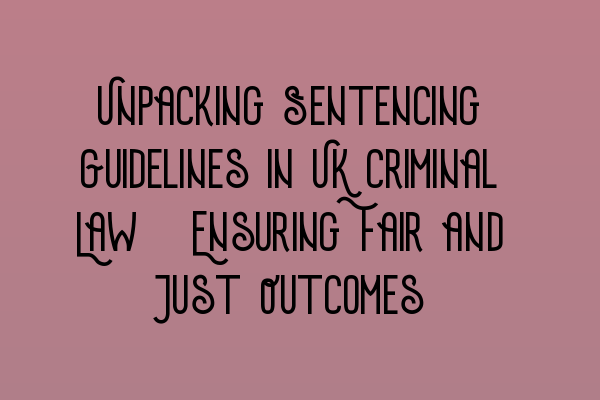Unpacking Sentencing Guidelines in UK Criminal Law: Ensuring Fair and Just Outcomes
As criminal law solicitors at SQE Criminal Law & Practice Law UK, we understand the complexities and importance of sentencing guidelines. Sentencing plays a crucial role in the criminal justice system, influencing the outcomes of cases and ensuring fair and just outcomes for both victims and defendants.
Before delving into the intricacies of sentencing guidelines, it is essential to comprehend their purpose. Sentencing guidelines provide a framework for judges and magistrates to determine appropriate sentences based on the specifics of each case. These guidelines help maintain consistency and transparency in the sentencing process, preventing arbitrary or unfair punishments.
The Deconstruction of Sentencing Guidelines
To grasp the nuances of sentencing guidelines in UK criminal law, it is vital to understand their structure and elements. Sentencing guidelines consist of two main components:
- Offence-specific guidelines: These guidelines focus on particular offences, such as assault, theft, or drug-related crimes. They outline the factors to consider when determining the severity of the offence and provide a range of possible sentences.
- General guidelines: These guidelines consider factors applicable to a wide range of offences, such as the defendant’s level of culpability, any aggravating or mitigating factors, and the potential impact on victims. They assist in determining the appropriate sentence within the range provided by the offence-specific guidelines.
The interplay between these two types of guidelines ensures that sentencing decisions are tailored to the unique circumstances of each case while maintaining consistency in the overall sentencing framework.
The Role of Mitigating and Aggravating Factors
One crucial aspect of sentencing guidelines is the consideration of mitigating and aggravating factors. These factors help adjust sentences either downward or upward based on the specific circumstances of the case. Mitigating factors can include the defendant’s remorse, previous good character, or cooperation with the authorities. On the other hand, aggravating factors may include the use of violence, premeditation, or targeting vulnerable victims.
By analyzing these factors, judges and magistrates can determine an appropriate sentence within the outlined range. However, it is important to note that the weight given to each factor may vary depending on the unique circumstances of the case. Therefore, legal representation that comprehends the intricacies of these guidelines is crucial to ensuring the best possible outcome for clients.
Staying Updated with Sentencing Guidelines
Sentencing guidelines are periodically reviewed and updated to reflect changes in legislation, societal attitudes, and judicial decisions. Staying abreast of these changes is essential for criminal law practitioners to provide accurate and up-to-date advice to their clients.
As part of our commitment to excellence, SQE Criminal Law & Practice Law UK offers comprehensive SQE 1 and SQE 2 Preparation Courses. These courses not only equip aspiring solicitors with the necessary knowledge and skills but also ensure they are well-versed in the latest sentencing guidelines. Understanding these guidelines is crucial for success in the SQE exams and for future legal practice.
For SQE 1 candidates, we offer an extensive collection of SQE 1 Practice Exam Questions and SQE 1 Practice Mocks FLK1 FLK2. These resources provide invaluable practice opportunities to familiarize yourself with the format and content of the exams.
To stay up-to-date with SRA SQE Exam Dates and ensure you are fully prepared, explore our SQE 1 and SQE 2 Preparation Courses. Our expert tutors will guide you through the complexities of sentencing guidelines, enabling you to navigate the criminal law landscape with confidence.
At SQE Criminal Law & Practice Law UK, we are dedicated to achieving fair and just outcomes. By understanding and unpacking the intricacies of sentencing guidelines, we can support our clients and contribute to a more equitable criminal justice system.
Related Articles:
SQE 1 Practice Exam Questions
SQE 1 Practice Mocks FLK1 FLK2
SQE 2 Preparation Courses
SQE 1 Preparation Courses
SRA SQE Exam Dates
